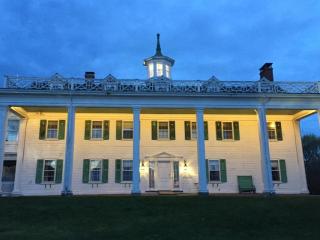Town will seeks non-profit reuse proposals for Emery Estate

Weymouth, MA – Mayor Robert Hedlund announced today that the Town will seek proposals from qualified not-for-profit, 501(c)(3) organizations to rehabilitate, operate, and manage the Emery House located at King Oak Hill in East Weymouth. The Emery House and its 24-acre grounds were acquired by the Town in 2011 with $1.9 million in local Community Preservation funds. While plans are currently underway to convert the grounds to a passive-recreational park, the question of whether the existing house can be successfully reused has remained outstanding.
“I continue to be an advocate for preservation, and my preference is to see the Emery House saved,” said Mayor Robert Hedlund. “However, without a viable reuse concept, the building will continue to be a drain on Town resources.”
The Emery House is a three-story, Georgian Revival-style home modeled after George Washington’s Mount Vernon mansion. Built in 1903 by William H. Binnian, the property was transferred in 1916 to Allan C. Emery, a prominent wool merchant, whose family owned the property for nearly a century before its purchase by the Town. Other buildings on the property include a two-story carriage house and three-stall garage.
Located at the summit of King Oak Hill, the former Emery property abuts multiple single-family neighborhoods and would almost certainly have been subdivided had the Town not acquired the parcel. The land preserves approximately 18 football fields of untouched open space for public access. The acquisition was completed by Mayor Susan Kay with approval of Town Council.
Since its acquisition, the Emery Estate has remained largely unused by the community. In 2016, the Town secured a $400,000 grant through the Massachusetts Parkland Acquisitions and Renovations for Communities (PARC) Program to assist with renovation of the grounds into a passive-recreational park. Rehabilitation of the Emery House was not included in the project, because such work is ineligible under the PARC Program.
Recognizing the need for a reuse plan, Mayor Hedlund appointed an advisory committee in December of 2016 to determine whether the Emery House can be preserved for a sustainable use without significant public investment. Thirteen members were appointed based on their experience and interest in a wide range of professions, including architecture, construction, historic preservation, education and grant seeking, and event planning and marketing.
In May of 2017, the Emery Reuse Advisory Committee adopted a final business plan for the Emery House. Based on extensive research, the plan recommends that the Town preserve and rehabilitate the former single-family home as a non-profit events venue and cultural center. Details of the plan include ideas for the building's management, operation, marketing, and financing, and includes detailed information on nine comparative and competitive historic property venues. These include the Daniel Webster Estate in Marshfield, the Endicott Estate in Dedham, and the Lightkeeper’s House in Cohasset.
“Our figures demonstrate that the event facility would make the [Emery House] self-sustaining in terms of operating and maintenance costs; there is also solid potential for the house to turn a good profit over time,” said the Emery Reuse Advisory Committee in its cover letter to Mayor Hedlund. “The cultural center could contribute in a small way to revenue, but more importantly can serve as a resource for the community and the surrounding area.”
Consistent with the committee’s recommendation, the Town intends to seek reuse proposals from qualified not-for-profit, 501(c)(3) organizations to rehabilitate, operate, and manage the Emery House as an historic resource in exchange for a long-term lease. The Town seeks proposals that are not only persuasive as to their feasibility but demonstrate a viable reuse concept, public benefit, rehabilitation plan, and relevant experience and sound financial qualifications.
“We need a business model that promises realistically to work, and promises realistically to work soon,” said Mayor Hedlund. “The advisory committee did a tremendous amount of research, which shows that the model of a non-profit historic venue can and does work with the right partnership. We hope to see proposals that match their expectation.”
The Town’s Request for Proposal (RFP) will become available on Friday, March 16, 2018. Interested 501(c)(3) organizations may request the RFP from nbulen@weymouth.ma.us. Qualified organizations will have approximately three months to respond to the Town’s request.

